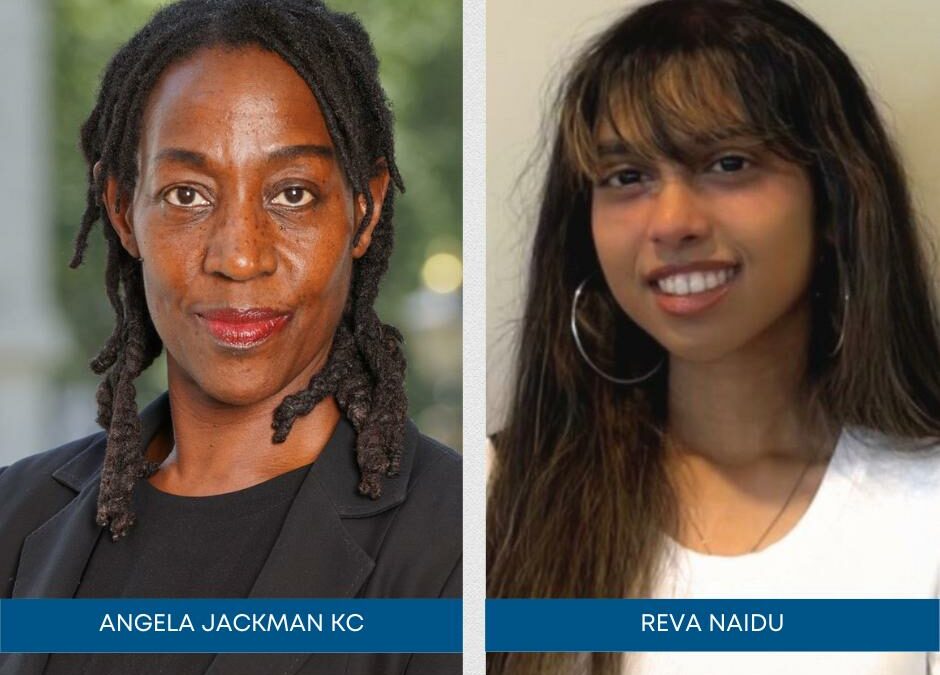
Farmers and Inheritance Tax
December 1, 2024
A New Era for Cross-Border Disputes: UK’s Ratification of the 2019 Hague Judgments Convention
December 6, 2024By Reva Naidu.
Reading time: four minutes
This month, Reva Naidu had the pleasure of connecting with Angela Jackman KC (Hon), a partner at Irwin Mitchell, who specialises in Mental Capacity, Education Law, and Public Law, underscoring the importance of inclusion, advocacy, and innovation. She practiced at Hackney Community Law Centre for 13 years before returning to private practice and becoming a partner, four years later.
Anegla boasts a distinguished career combining private practice with academia, recognised through the Legal Aid Lawyer of the Year and Modern Law Awards, and citations in Legal 500 and Chambers and Partners. Notable cases include a landmark judicial review concerning school hair policies and a Supreme Court challenge to Northern Ireland’s abortion laws. Angela actively contributes to various organisations promoting human rights, diversity, and inclusion, such as the Strategic Legal Fund for Vulnerable Migrants, and sits on the Law Society’s Human Rights Committee. She is also an author for Legal Action Group, and has written articles for various organisations, including the Runneymede Trust.
RN: What made you choose mental capacity as a specialism?
AJ: My specialism in mental capacity law arose as a result of receiving regular referrals from the Official Solicitor and family members at a previous practice. I found the area fascinating and it was relatively new, shortly after the jurisdiction of the Court of Protection (COP) was introduced.
With the introduction of the COP’s jurisdiction replacing the default inherent jurisdiction of the High Court for best interests disputes, the area of law was particularly novel, challenging and rewarding to develop as a new specialism, in addition to deprivation of liberty.
RN: What has been one impactful case that you have worked on?
AJ: One of my most impactful cases was Re M (Best Interests: Deprivation of Liberty) [2013] EWHC 3456 (COP), which first introduced the practice of judges visiting patients in care homes before making “best interests” decisions. Now standard, and governed by judicial guidance, this novel step emphasized placing P at the heart of proceedings and the importance of judges hearing directly from P.
RN: Could you tell us about the course you designed for practitioners seeking status as Accredited Legal Representatives appointed by the COP to represent individuals who lack capacity to make decisions on disputed welfare issues?
AJ: From 2015 to 2021, I worked part-time as a CPD Consultant at City Law School, contributing to the development and delivery of practitioner training. In collaboration with the Law Society, we designed a mandatory two-day course for practitioners seeking accredited legal representative status. The course, aimed at experienced delegates, focuses on legislation, practice reviews, and practical application through case studies, breakout sessions, and exercises. Drawing on my expertise, I advised on key areas to test practitioners’ knowledge of capacity legislation, mental health law, and community care law in England and Wales. The course curriculum ensures accredited practitioners possess the specialist knowledge needed to navigate the health and welfare jurisdiction of the COP. Completion of this course is a prerequisite for applying for accreditation through the Law Society.
RN: What policy changes are required in the sectors dealing with children and education, to better protect and safeguard them?
AJ: Protecting children, especially those with special educational needs, requires increased resources for public bodies like local authorities and integrated care boards. These bodies must fulfill their statutory duties, ensuring each child’s needs are properly assessed and met. Budget constraints cannot excuse breaches of these legal obligations.
RN: What advice would you give to law students aspiring to join the human rights and public law sectors?
AJ: If possible, aspiring public law students should try to gain some experience within the fields of human rights and public law, through legal clinics and/or pro bono opportunities which students really ought to try to take advantage of. Alternatively, students can show their interest and knowledge by attending seminars and highlighting their efforts to learn more, in their applications.
Students may consider joining relevant organisations such as Young Legal Aid Lawyers, Legal Aid Practitioners Group and the Human Rights Lawyers Association.
RN: Whilst you were a student, did you have a mentor? What role has mentorship played in your career so far?
AJ: I benefited enormously from having a mentor whilst studying for A levels, advising me regarding colleges at Oxford University, and mentored me through the process. I was also mentored by senior practitioners whilst undergoing my training contract, which was of enormous benefit.
When I first started my training there were even fewer black and minority ethnic trainees and qualified lawyers in the field. I very much benefitted from co-mentoring provided by attending organisations such as the Society of Black Lawyers and Black Women Lawyer groups.
RN: As an expert panel member of the Strategic Fund for Vulnerable Migrants, what has been the most impactful action aided by the organisation so far?
AJ: The Strategic Fund for Vulnerable Migrants (SLF) has funded multiple actions which have been impactful in many ways and covered wider public interest issues. Pre-litigation work funded by the organisation has also been extremely important.
RN: The sectors of human rights, public law, and mental health require empathy and understanding. What steps do you take to avoid burnout?
AJ: Wellbeing is extremely important for all practitioners. Some areas of public law can, at times, be particularly challenging on a personal level. Recognition of this is crucial, and I advise strongly in ensuring one has regular outlets, including leisure/physical activities. For me, my wellbeing is maintained through exercise and having proper ‘downtime’ to relax completely.
Quickfire Questions…
RN: Your favourite spot in London?
AJ: The view from Waterloo bridge at night.
RN: Favourite song right now?
AJ: ‘Calm Down’ by Rema.
Thank you to Angela for this insightful interview! For more insights from Angela, read this event summary: https://thestudentlawyer.com/2024/11/08/reclaiming-narratives-how-black-women-in-law-are-pushing-for-change/.





